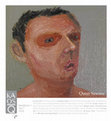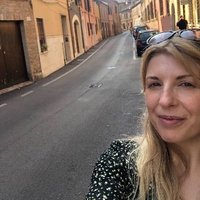Papers by A. Serdar Küçük
Offscreen, 2022
This short essay interprets Alex Garland's "Men" (2022) as a parody of gender. It is argued that ... more This short essay interprets Alex Garland's "Men" (2022) as a parody of gender. It is argued that the film pokes fun at how both men and women are so often ready for self-victimization in relationships, positioning themselves and the others within narrowly constructed stereotypes as if the two sexes have to be inherently different from each other.

sinecine: Journal of Film Studies, 2019
Since the early 1990s, a strong preoccupation with history has been one of the defining features ... more Since the early 1990s, a strong preoccupation with history has been one of the defining features of queer cinema. Many filmmakers, including Derek Jarman and Tom Kalin, have revisited and rewritten official histories, and many others incessantly continue to do so with the aim of constructing a new future via the powerful medium of cinema. Against obliteration by two oppressive historicisms at once, i.e., white and straight, black queer filmmakers Marlon Riggs and Isaac Julien have embraced the same method in postmodern terms in Tongues Untied (1989) and Looking for Langston (1989) in the earlier phase of the so-called Queer New Wave. Following in their footsteps, Cheryl Dunye and Rodney Evans have carried the tradition to a new level with The Watermelon Woman (1996) and Brother to Brother (2004) in such a way that is still unconventional in form, yet more radical in content. In the following textual analyses, it is argued that both filmmakers not only manipulate history but also posit filmmaking as a means of hope and regeneration for black lesbians and gays of the United States, deploying blackness and queerness provocatively to problematize sanctioned identities of race, gender, and sexuality.

Camera Obscura, 2020
The following article investigates the origins and functions of particular settings in queer film... more The following article investigates the origins and functions of particular settings in queer films by examining four examples from different national contexts: Shortbus (dir. John Cameron Mitchell, US, 2006), Weekend (dir. Andrew Haigh, UK, 2011), Stranger by the Lake (L’inconnu du lac, dir. Alain Guiraudie, France, 2013), and Tropical Malady (Sud pralad, dir. Apichatpong Weerasethakul, Thailand, 2004). The textual analyses highlight a range of prevalent queer film settings, such as the road and nature, in which queer characters take refuge. The study aims to identify a transnational countercultural stance in various uses of setting by concentrating on the notion of escape in a theoretical framework that draws on the work of Gilles Deleuze and Félix Guattari, José Muñoz, and Marc Augé. In the context of the study, the production of alternative spaces in queer cinema is treated as a revolutionary practice that challenges homophobia and heteronormativity, which sometimes coexist with class inequality and racism. The discussion finally suggests that there is a social critique of civilization behind the escapism and pessimism, as well as utopianism, in queer cinema.
https://drive.google.com/file/d/1tv88UNAlY9cVqFCCK-HVcoWM9HvzVNyp/view?usp=sharing
https://askucuk.files.wordpress.com/2020/12/queer-film-settings.pdf
https://doi.org/10.1215/02705346-8359530
KaosQueer+, 2019
Bu çalışma Bahâ Tevfik’in yazınsal yönden övgüye değer ancak bir o kadar da görmezden gelinmiş ik... more Bu çalışma Bahâ Tevfik’in yazınsal yönden övgüye değer ancak bir o kadar da görmezden gelinmiş iki kısa öyküsünün karşılaştırmalı metinsel analizini içermektedir. Tevfik’in “Aşk, Hodbinî” ve “Ah Bu Sevdâ!..” başlıklı öykülerindeki eşcinsel aşk tasviri çağdaşlarının konuya yaklaşımından oldukça farklıdır. Makalede yazarın bu iki öyküyle çağdaş Türk yazınında kuir varoluşa olan kayıtsızlığa alternatif sunduğu iddia edilmektedir. Çalışmada öncelikle on dokuzuncu yüzyıl sonu ve yirminci yüzyıl başındaki genel atmosfere ve edebiyattaki değişime değinilmekte, sonrasında ise Tevfik’in kuramsal yazılarının ışığında öykülerinin sıra dışı yönü ve kanon içerisindeki marjinal konumu aydınlatılmaktadır.
KaosQueer+, 2019
The following study aims to excavate and reclaim Bahâ Tevfik’s two beautifully written yet totall... more The following study aims to excavate and reclaim Bahâ Tevfik’s two beautifully written yet totally undermined short stories titled “Alas! Love” (Ah Bu Sevdâ!.., 1910) and “Love, Selfishness” (Aşk, Hodbinî, 1910). Tevfik’s approach to gay love is significantly different from that of his contemporaries. The following study claims that Tevfik’s short stories covertly challenge the prevalent erasure of queer desires in modern Turkish literature, and they assert the inexorable existence of homosexuality as a natural and perpetual part of the Ottoman life styles. The article first sketches out the general literary atmosphere and changes in the late nineteenth and early twentieth century. Then, by referring to the author’s theoretical writings, it endeavors to highlight the radical aspects of Tevfik’s short fiction and its marginal place within the canon.

KaosQueer+, 2018
Bu çalışma Looking for Langston, Edward II, The Hours and Times, The Watermelon Woman, Swoon ve T... more Bu çalışma Looking for Langston, Edward II, The Hours and Times, The Watermelon Woman, Swoon ve Tongues Untied gibi queer temalı klasiklerdeki zaman kavramını yeniden değerlendirmek üzere 1980’lerin sonu ve 1990’ların başındaki Yeni Queer Sineması’nı ziyaret ediyor. Çalışmada Yeni Queer Sineması’nın deneyselliğe, revizyonizme ve tarih yazımına duyduğu yoğun ilginin AIDS krizi ve diğer etmenlerden çok hâlâ queer film üretimini olumsuz yönde etkilemeye devam eden görünürlük meselesi olduğu iddia ediliyor. Metinsel analiz yöntemiyle incelenen filmlerin seçiminde üç ana kriter rol oynuyor: Birincisi, Ruby Rich’in “New Queer Cinema” başlıklı başucu metninde bahsi geçen filmler arasında tarihsellik ve görünürlük konusunu biraz daha yoğun biçimde yansıtmaları. İkincisi, benzerlik veya zıtlık bakımından bütünlük-devamlılık arz etmeleri (örneğin aynı dönemden Poison filmi yerine içerik olarak Tongues Untied filminden daha fazla farklılaşan Swoon filminin seçilmesi gibi). Son olarak, daha az tartışılan Siyahî queer filmlere ağırlık verilmesi.
Film Criticism Journal, 2019
The following discussion draws parallel between the motif of blindness in the film adaptation of ... more The following discussion draws parallel between the motif of blindness in the film adaptation of Bird Box (S. Bier, 2018) and individual remoteness from world affairs, centering on how "apathetic blindness to human affairs and the ecosystem develops into collective misery." It also highlights the key differences between the novel and its adaptation.










Uploads
Papers by A. Serdar Küçük
https://drive.google.com/file/d/1tv88UNAlY9cVqFCCK-HVcoWM9HvzVNyp/view?usp=sharing
https://askucuk.files.wordpress.com/2020/12/queer-film-settings.pdf
https://doi.org/10.1215/02705346-8359530
https://drive.google.com/file/d/1tv88UNAlY9cVqFCCK-HVcoWM9HvzVNyp/view?usp=sharing
https://askucuk.files.wordpress.com/2020/12/queer-film-settings.pdf
https://doi.org/10.1215/02705346-8359530